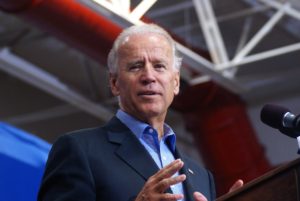The Mainstream Media Can’t Resist a Centrist Democrat
Across corporate media, the democratic primaries are being portrayed as a choice between progressive idealism and a more credible pragmatism. Wilfredo Lee /
Wilfredo Lee /
The battle for the Democratic presidential nomination is dominating the news cycle, and two of the three clear frontrunners in polls, Elizabeth Warren and Bernie Sanders, draw their support from the resurgent left of the party. Sanders in particular describes himself as a democratic socialist and a threat to the establishment. The third favorite, Joe Biden, presents himself not as the representative of the conservative wing, but as a pragmatic, centrist reformer (FAIR.org, 7/17/19).
Across corporate media, the choice is being portrayed as between progressive idealism and a more credible pragmatism—not left vs. right, but left vs. realistic: “Should Democrats Be Going Big or Getting Real?” asked the Associated Press (7/31/19), while the LA Times (7/31/19) defined the choice as between those who “call for big, ambitious policies” and those with a “more centrist, pragmatic approach.”

Pundits and analysts have expressed profound skepticism of the progressive platform, which includes universal healthcare, public funding of higher education, a “Green New Deal” to combat climate change and higher taxes on the wealthy. They urge voters to choose more moderate (i.e. pro-corporate) candidates, who, they claim, stand a far greater chance of unseating Donald Trump in 2020 (FAIR.org, 7/2/19).
Despite this, the left of the party has continued to gain momentum, with many voters drawn to the argument that bold progressive programs are not only a realistic response to the serious problems the nation faces, but also a solid strategy for winning elections by appealing to non-voters as well as the many swing voters who have conservative social views but lean left on economic policy (FAIR.org, 6/20/17).
From skepticism to hostility
In the face of increasing public rejection of their definition of “pragmatism,” corporate media have moved from skepticism to outright hostility. Washington Post columnist David Von Drehle (8/2/19) savaged Warren, claiming it is embarrassingly “self-evident” her “idealistic” plans are way “out of the mainstream,” and instead America needs a healthy “dose of pragmatism” from someone like health care entrepreneur-turned politician John Delaney, who will stop this Medicare for All nonsense.

Similarly, a New York Times headline (7/30/19) asserted that “Ahead of Debates, Pennsylvania Democrats Want Candidates to Stress Pragmatism.” The story, by reporter Trip Gabriel, described supposed runaway grassroots “excitement” for Joe Biden, even among strong progressives, who “for pragmatism, would choose him.” It also presented Sanders’ support at virtually zero—based on “a straw poll at the Newtown [Pennsylvania] picnic”—suggesting that even Pete Buttigieg is seven times as popular.
This narrative of Sanders’ limited appeal was undercut by the Times itself (8/2/19) just three days later, when it produced an interactive map of the US, showing Sanders had far and away the most campaign donations across the U.S., including in the two counties the Times’ Gabriel visited for the article. Sanders’ edge in supporters was so overwhelming the Times had to produce a second map, showing the top recipient of donations in every congressional district aside from the Vermont senator.
In the Washington Examiner (7/10/19), Maddie Solomon warned that the “left-wing elites’” charge towards socialism will alienate the vast “moderate” political center of America, so Democrats must be “pragmatic” to beat Trump and choose the “respected” candidate who is “high in the polls”: Joe Biden.

Meanwhile, in the Washington Monthly (7/30/19), David Burke pitched Minnesota Sen. Amy Klobuchar as “most electable candidate,” as she is “grounded in reality” and favors “pragmatic legislation”—in other words, she “has been careful not to tack too far to the left.” CNN’s Jeff Zeleny (2/18/19) likewise lauded Klobuchar for her courageous pragmatism, which, according to his glowing portrait, means “resisting the urge to pander to the party’s progressive wing” by strongly opposing Medicare for All, the Green New Deal and free public college tuition.
When Democratic politicians respond to the will of their constituents by endorsing progressive policies, it’s often presented as “pandering,” or even “appeasement” (e.g., New York Times, 6/29/19; Associated Press, 5/23/19; Vanity Fair, 4/5/19)—a word most often used in connection to European collaboration with the genocidal regime of Adolf Hitler. In contrast, talk of “appeasing” so-called moderates or even big donors is extremely rare in the media, subtly highlighting whom they think Democrats should represent.
USA Today editorial page editor Bill Sternberg (7/29/19) warns Democrats not to “indulge the left,” channeling the wisdom of right-wing candidates like Delaney, who offers “real solutions, not impossible promises,” and “policies that make sense, that you can pay for and that you can get done.” Sternberg sums up the message of the “moderates”:
If the party keeps lurching to the left, rehashing old battles and alienating working-class voters, President Donald Trump will be putting his hand on the Bible again in January 2021.
How pragmatic are the pragmatists?
While the National Review (5/17/19) might tell us that the “common sense play” for the Democrats is to “nominate a non-socialist,” a “pragmatist” like Biden or someone with a “similarly relatively moderate profile” to appeal to Obama-to-Trump voters, voters are right to question the sacred logic that moving to the right is a winning tactic.

Thirty-two of 33 polls show Sanders defeating Trump in a general election, often in landslides, with Warren beating the current president in most projections too. Medicare for All is supported by the vast majority of Americans, including most Republican voters, while up to 60% of the country wants to see college tuition made free. Two-thirds of the population favor raising the federal minimum wage to $15/hour. Large majorities of Republicans support Warren’s wealth tax proposals, and the public is behind a Green New Deal.
It could be argued that the progressive agenda would be a huge vote winner, not just from Trump voters, but also picking up non-voters. Turnout in US elections is consistently low compared to other developed countries, and in 2016 almost as many adults did not vote as chose the Democrats and Republicans combined. Non-voters are chiefly from lower-income backgrounds, and would be the primary beneficiaries of democratic socialist or progressive reforms. Thus a leftward turn could boost the Democratic base, and undermine Trump’s support from the white working-class media are so keen on profiling (FAIR.org, 3/30/18, 11/13/18).
The consistent media advice that Democrats should “pragmatically” move to the right, and embrace what were mainstream Republican positions a few years ago, is something FAIR has tracked for decades. (See Extra!, 9/92, 1–2/95, 6/04, 7–8/06, 1–2/07; FAIR.org, 11/7/08, 3/16/10.) And when this advice does not work, history is retroactively re-written to fit it.
In 2006, the New York Times (3/12/06) claimed that the Democrats lost the 2000 election because Al Gore “unmoored himself” from Bill Clinton’s centrist politics to run as a “populist scourge of Big Oil and Big Healthcare,” and therefore “drastically underperformed.” Yet while he was running, media were presenting him as a thoroughly “pragmatic” politician (Economist, 8/10/00). Indeed, the Times itself reported that Gore’s “centrist agenda” (8/15/00) was so conservative that his support from the Democratic base was wilting (8/17/00, 9/9/00).
In reality, Bill Clinton moved his party to the right, as the media approvingly reported at the time. “The Democratic platform,” noted the Christian Science Monitor (7/17/92) “is not Mondale/Dukakis liberal, but Clinton moderate,” applauding the Clinton/Gore team’s pragmatic commitment to “cutting entitlement programs” and “compromising” with Republicans. Meanwhile, the New York Times(1/27/94) discussed how Clinton’s “pragmatic,” “centrist agenda” was distinctly conservative. But by 2008, the explanation as to why the Democrats collapsed in the 1994 midterms was due to its nonexistent radical and unpopular leftist platform (e.g., LA Times, 11/5/08; Wall Street Journal, 11/5/08; Washington Post, 11/5/08).
And going further back, both Mondale and Dukakis’ losing presidential bids pushed the Democrats to the right as well. In real time, the New York Times (5/8/88) had praised Dukakis’ “pragmatic, centrist approach.” When Mondale ran, similarly, the Times (7/22/84) depicted his 1984 campaign as “a shift from liberal positions of 1976 and 1980,” noting the only mention of “liberalism” in his platform was to denigrate it. But as FAIR’s Jim Naureckas (Extra!, 9/92) noted, “When the ‘pragmatists’ lose badly with their centrist approach, they are repainted after the fact as radicals, so the strategy of tilting to the right can be tried again and again.”
A moderate class war
And that is the trick; Democrats are pragmatic when they win and too left-wing when they lose. Corporate media, funded by the same sources that donate to “pragmatic” politicians, present a rightward shift not as a political decision to ignore working Americans in order to favor the wealthy, but as a sensible reaction based on facts, in contrast to their ideologically driven opponents.
Of course, pragmatists are every bit as ideologically motivated as progressives, communists or the most craven white nationalists. However, corporate media hide their pro-business positions behind a veneer of pragmatism, presenting their ideas as common sense: Millions of Americans should naturally vote against their own interests, because those who ask for more risk having everything taken away from them.
Judging by the polls, and multiple studies showing the public is sick of rampant inequality, the truly pragmatic thing to do this election cycle, the way to appeal to the actual political center, may be an all-out class war against Donald Trump. But don’t expect a media owned by millionaires and billionaires to be on board with this.
Your support matters…Independent journalism is under threat and overshadowed by heavily funded mainstream media.
You can help level the playing field. Become a member.
Your tax-deductible contribution keeps us digging beneath the headlines to give you thought-provoking, investigative reporting and analysis that unearths what's really happening- without compromise.
Give today to support our courageous, independent journalists.






You need to be a supporter to comment.
There are currently no responses to this article.
Be the first to respond.